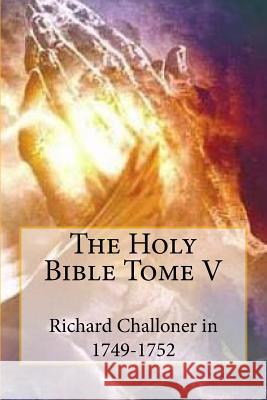The Holy Bible Tome V » książka
The Holy Bible Tome V
ISBN-13: 9781518791406 / Angielski / Miękka / 2015 / 338 str.
Richard Challoner, born September 29, 1691 in Lewes and died January 12, 1781 in London, is an English Catholic bishop, a major figure of English Catholicism during much of the eighteenth century and famous for its review of the translation of the Bible Douai. Youth and education On July 29, 1705, the young Richard entered the English College, Douai, France, with a sort of scholarship. It then passes twenty-five years, first as a student and then as a teacher and as a university vice president. At the age of twenty-one, he was chosen to teach the classes rhetoric and poetry, both forming the upper classes in the humanities. He was ordained priest 28 March 1716, received his bachelor's degree in theology at the University of Douai in 1719 and is named the following year as vice president. In 1708, he takes the oath to return to England as a missionary. In 1730, he received permission to embark for England on August 18 and decided to reside in London. It was at this time that he actually begins to exercise his priestly office. Although criminal laws are not applied with extreme severity, the lives of many Catholic priests is still difficult, especially in London. It then passed to a secular and celebrates Mass in secret, while small gatherings can meet without being noticed In 1738, died the president of Douai College, Robert Witham. Senior college wish then see Challoner father to succeed him as president. Bishop Benjamin Petre, Vicar Apostolic of the London District, however, refused this request on the grounds that it wants to see him as his coadjutor to succeed him. On the other hand, the Sacred Congregation for the Propagation of the Faith has already organized Challoner appointed as coadjutor vicar of Douai. The papal brief is issued September 12, 1739, raising Challoner to the episcopal dignity as coadjutor vicar of the London district, this being assigned the titular seat of Debra. Description: The Douay-Rheims Bible The Douay-Rheims Bible (also known as the Rheims-Douai Bible or Douai Bible, and abbreviated as D-R and DV) is a translation of the Bible from the Latin Vulgate into English made by members of the English College, Douai, in the service of the Catholic Church. The New Testament portion was published in Reims, France, in 1582, in one volume with extensive commentary and notes. The Old Testament portion was published in two volumes thirty years later by the University of Douai. The first volume, covering Genesis through Job, was published in 1609; the second, covering Psalms to 2 Machabees plus the apocrypha of the Vulgate was published in 1610. Marginal notes took up the bulk of the volumes and had a strong polemical and patristic character. They offered insights on issues of translation, and on the Hebrew and Greek source texts of the Vulgate. The purpose of the version, both the text and notes, was to uphold Catholic tradition in the face of the Protestant Reformation which up till then had overwhelmingly dominated Elizabethan religion and academic debate. As such it was an impressive effort by English Catholics to support the Counter-Reformation. The New Testament was reprinted in 1600, 1621 and 1633. The Old Testament volumes were reprinted in 1635 but neither thereafter for another hundred years. In 1589, William Fulke collated the complete Rheims text and notes in parallel columns with those of the Bishops' Bible. This work sold widely in England, being re-issued in three further editions to 1633. It was predominantly through Fulke's editions that the Rheims New Testament came to exercise a significant influence on the development of 17th century English.
Zawartość książki może nie spełniać oczekiwań – reklamacje nie obejmują treści, która mogła nie być redakcyjnie ani merytorycznie opracowana.











